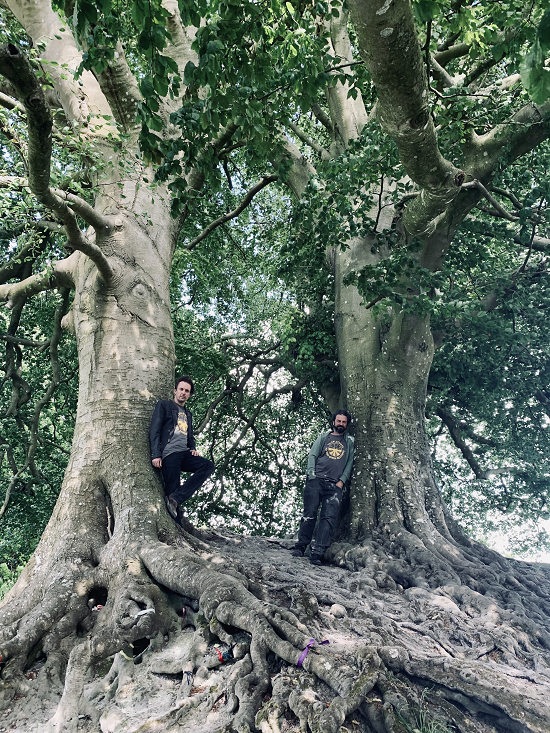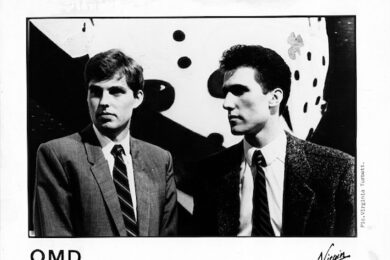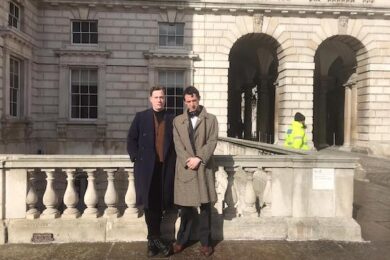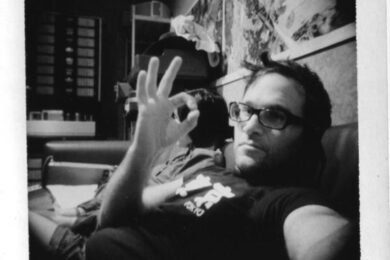“Every time you do acid it’s different from the last, but it’s still got a unique signature to it,” says Michael J York. It’s roughly analogous to the way in which the music of Teleplasmiste – his duo with Mark O Pilkington – can be experienced. Their music is lush and layered like a rainforest floor, a complex lattice of sound that moves in several directions at once. Some of those movements are under the surface, buried purposefully low in the mix “so they can surprise you when you’re under different conditions,” as Pilkington puts it. “Like psychedelics, we like to think that people can return to the music in different moods and different frames of mind, and that different things will appear in their hearing.” It fits the cosmic experimentation that the duo have explored on previous albums such as To Kiss The Earth Goodbye, and acts as an adjunct to York’s previous work as part of Coil, and currently alongside Steve Davis and Kavus Torabi in The Utopia Strong.
They inhabit soundworlds that, Pilkington says, are elusive, that reward the seeker. “It’s striving for the ineffable, every time you think you can question it, it’ll evaporate or scurry away.” Adds York: “I think all of our tracks are about the same thing, in a way, and that is the thing that can only be described by that sound.” Perhaps it’s better, then, to view Teleplasmiste as providers of a space in which a special reaction, unique to their listener, can occur. Pilkington uses the comparison of a lightning strike. “It’s not a one-way process – there are electrons rising from the ground to create the path, as well as coming down from the sky. The point where those two things meet is where the reaction happens.”
That is not to say, however, that Teleplasmiste eschew the hard work. These shifting spaces are the product of meticulous curation. They strive for “emotional ambiguity,” as York puts it. “So that if you’re in a jolly mood you can perceive the music as jolly, and if you’re feeling pissed off you can perceive it as melancholy.” When one track starts to sound too ominous, “I’ll put some optimistic elements in. In a way that makes it sounds even more disturbing, because they’re so at odds, there’s this tension between ominousness and positivity.” They might build a track entirely around a rhythmic element, and then “totally erase it, leave a filleted piece of music,” says Pilkington. “It’s important that we don’t tell you how to feel, or how to listen. It’s got to be like something in nature that you can approach, and it will respond.” It’s a creative process that requires intense, detailed work.
For their new release, however, for the first time Pilkington and York had to record under pressure. At the time The Quietus commissioned them to record an EP exclusively for our subscribers, by York’s own admission “I didn’t have a lot of spare time.” Adds Pilkington: “It was a rare instance of us having to make decisions quickly that might have been left a lot longer in other circumstances. There are things that we might have re-recorded or perfected” They dug into their respective archives, in which were a host of past ideas, recorded and saved over years of exploratory modular synth sessions. They enjoyed the rigours of working to a deadline, “it forced me to work in the evenings after a day’s work, at a time when I’d usually be more sedentary,” York says. The eventual release, Of Nature And Electricity, is made from those fragments, swiftly and intensely hammered together.
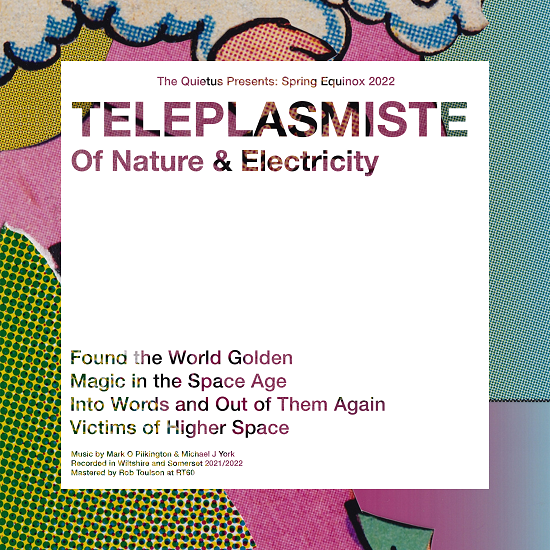
What’s most telling about the record, however, is that there are no seams showing between all of its constituent parts. There’s no ounce of it that feels rushed. Rather, Of Nature And Electricity is as forward-thinking as Teleplasmiste have ever been. “Ironically, it’s actually some of the most complex music we’ve ever made,” says Pilkington. Its four tracks, only one of which is less than eight minutes in length, are all vast in scope. “I guess there’s an inherent paradox,” Pilkington continues. “Producing languorous, cosmic music in a hurry sounds contradictory…” Rather than the collage-like approach to composition resulting in something disparate, it results in something dramatic, music that embraces intense swings in momentum and turns them to their advantage. “If we’d had more time, we might have separated pieces out and made them each individual tracks, but in fact it was really great to find ways to make a piece metamorphose into something completely different. I think Mike’s particularly good at joining things together that you don’t imagine would work,” Pilkington says. For York, it was something of a lesson: “I think a lot of that agonised decision making and fiddling around forever with EQ in the past was actually a kind of neurosis. The end result sounds just as polished and detailed as anything else we’ve done.” At the end of the process, which took place mainly remotely, they had set aside three days together in person to add overdubs and any final touches. In the spirit of the record, however, they ended up barely filling two of them.
Teleplasmiste have long recognised that there’s a certain amount of surrender necessary when it comes to making interesting music. An admittance, says York, “that sometimes the music’s cleverer than we are. We guide our machines to do their thing, then we’re just the gatekeepers of what we let through. When you sit back, you’re listening to this stuff that’s been made by an external agency.” “That’s always been a big part of how we work,” adds Pilkington. “We gratefully receive what they give us, then work out how the pieces fix together.” If they play live, he says, “We make sure the synths are given equal weight in the band. Sometimes they refuse to perform, but that can happen with humans too, I suppose!”
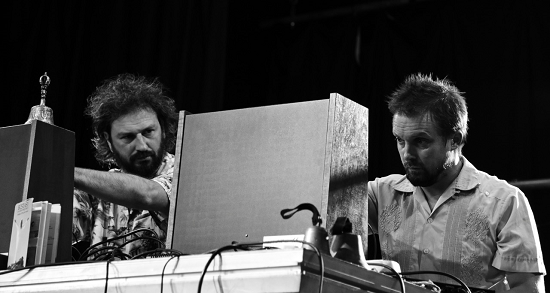
At the same time, however, York and Pilkington’s music is not entirely synthetic. They work hard to avoid the pitfalls of some modular synth music, “where it’s processed, like those HiFi demonstration records you used to find in charity shops.” For all their new record’s wild waves of machine-generated noise, the band also weave in plenty of organic material. Three of the four tracks, York points out, “have got stuff recorded with a microphone on them.” On the meditative closer ‘Into Words And Out Of Them Again’, says Pilkington, “we noticed how present the air passing from Mike’s mouth into the pipe he’s playing was. You can hear it rasping and whistling. It just gives it a really vivid, organic presence, that can be lacking with some of your ‘music untouched by human hands’.” The EP’s title, Of Nature And Electricity, also sums up the band’s entire ethos.
It’s the way Teleplasmiste find harmony between those two opposites that makes their music so engaging, using the power of analogue synthesis to tap into the ineffable, but simultaneously injecting enough nature and humanity to make it emotionally accessible – a cosmic canvas for that act of expressive exchange, which can be entirely different depending on the listener. “We’re interdimensional travel agents, listen and see where you end up!” proclaims Pilkington. They are immensely proud of the EP, and the way they turned the limitations under which it was recorded into a chance to go bolder and more experimental. “It’s a step further out from what we’ve done before,” says Pilkington. “It’s some of the most far out music we’ve ever made.”
To receive the new EP by Teleplasmiste, as well as a host of other benefits including exclusive essays, podcasts and playlists, and loads more specially-comissioned music, become a Quietus Sound & Vision subscriber. You can do so here

